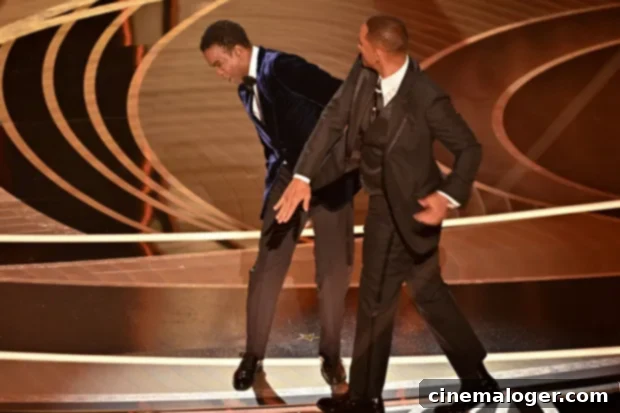The Will Smith Chris Rock Oscars Slap: Legal Ramifications, Academy’s Ban, and Unfolding Drama
The 94th Academy Awards ceremony, typically a night of glitz, glamour, and celebration of cinematic achievement, was indelibly marked by an incident that sent shockwaves across the globe: actor Will Smith, 53, walking onto the stage and slapping comedian Chris Rock, 57. The shocking altercation, triggered by a joke Rock made about Smith’s wife, Jada Pinkett Smith, 50, instantly became the most talked-about moment of the evening and ignited a fierce debate about celebrity conduct, personal responsibility, and legal accountability. While many assumed the legal chapter was closed when Rock initially declined to press charges, a Los Angeles-based criminal attorney sheds light on the surprising reality: the door for legal action remains open for an entire year.
Shortly after the unprecedented event unfolded live on television and in front of a global audience, the Los Angeles Police Department (LAPD) issued a statement confirming that Chris Rock would not be pursuing charges against the then-Best Actor winner, Will Smith. This decision left many viewers and legal experts alike astonished, questioning how such a public act of assault could seemingly go unaddressed by law enforcement. However, legal experts emphasize that an initial refusal to press charges does not equate to a permanent waiver of rights. According to Los Angeles criminal attorneyLara Yeretsian, who spoke EXCLUSIVELY with HollywoodLife, Chris Rock retains the legal right to change his mind and initiate proceedings against Will Smith for a significant period. “Chris Rock has a year to change his mind, and he’s the only person who can trigger Smith’s arrest,” Attorney Yeretsian clarified, highlighting the critical role of the victim in such cases.
The Misdemeanor Statute of Limitations: A One-Year Window
The legal framework governing such incidents in California offers a specific timeframe for victims to pursue justice. Attorney Yeretsian explained the applicable statute of limitations: “The statute of limitations for a misdemeanor in California is one year, and only the victim of a misdemeanor crime can make a citizen’s arrest.” This means that despite the passage of time since the incident at the Oscars, Chris Rock still has until March 2023 to decide whether he wishes to file a formal complaint or press charges against Will Smith. This crucial one-year window provides ample time for reflection, negotiation, or simply a change of heart, underscoring the legal complexities that often surround high-profile celebrity incidents. While Yeretsian noted at the time that “At this point, it’s highly unlikely that Chris will ask for a filling against Smith,” the legal possibility itself is significant and often misunderstood by the public.
The LAPD’s immediate response further detailed the situation, providing clarity on their limitations. In a statement released to HollywoodLife, the department stated, “LAPD investigative entities are aware of an incident between two individuals during the Academy Awards program. The incident involved one individual slapping another. The individual involved has declined to file a police report. If the involved party desires a police report at a later date, LAPD will be available to complete an investigative report.” This statement was pivotal, as it confirmed Rock’s initial decision but also explicitly acknowledged his ongoing right to file a report at a future date within the legal timeframe. It also highlighted the LAPD’s role as facilitators, rather than immediate enforcers, in cases where a victim chooses not to press charges for a misdemeanor not witnessed directly by an officer.

Why No Immediate Arrest for the “Slap Heard Around the World”?
The public outcry and confusion following the incident often revolved around why Will Smith wasn’t immediately arrested, given that the entire world witnessed the slap unfold on live television and countless digital replays. Attorney Yeretsian addressed this common misconception, explaining the critical distinction in how misdemeanors are handled by law enforcement when not witnessed by an officer. “As absurd as it seems, an arrest is not possible in this case despite the fact that the entire world watched the infamous slap. LAPD’s hands are tied. None of their officers personally witnessed Will Smith slap Chris Rock.” This legal technicality is crucial: for a misdemeanor, an officer must either directly witness the crime or the victim must initiate a “citizen’s arrest.” The widely circulated video, while undeniable evidence, does not grant the LAPD the authority for an arrest without one of these conditions being met. The legal system, even in the age of pervasive digital recording, adheres to specific procedural requirements.
Yeretsian further elaborated on the concept of a citizen’s arrest, which became the only other avenue for immediate legal action. “The only other way to effectuate an arrest for a misdemeanor crime not witnessed by an officer is through a citizen’s arrest, something Chris Rock is not willing to do.” A citizen’s arrest is a provision that allows a private person to arrest someone whom they reasonably believe has committed a felony or certain misdemeanors in their presence. In this scenario, Chris Rock would have had to make such an arrest, or formally request it from the LAPD, for an immediate arrest of Will Smith to occur. Rock’s decision not to pursue this path, whether for personal or professional reasons, effectively kept the LAPD from taking direct action on the night of the Oscars. This highlights the power and discretion a victim holds in the initial stages of a misdemeanor case, particularly one that occurs without direct police observation.

Beyond Criminal Charges: The Academy’s Unprecedented Ban and Public Repercussions
While Will Smith has likely avoided criminal charges stemming directly from the “slap heard around the world,” the incident did not leave him unscathed. The repercussions were swift and severe, primarily from the very institution that hosted the event. On April 8, The Academy of Motion Picture Arts & Sciences announced a landmark decision: Will Smith would be banned from the Academy for a decade. This move, unprecedented in its scope for such an incident, underscored the Academy’s condemnation of Smith’s actions and its commitment to upholding the integrity of its events and members.
In a statement obtained by HollywoodLife, Academy President David Rubin and CEO Dawn Hudson articulated the board’s decision: “The Board has decided, for a period of 10 years from April 8, 2022, Mr. Smith shall not be permitted to attend any Academy events or programs, in person or virtually, including but not limited to the Academy Awards.” This comprehensive ban effectively exiles Smith from all official Academy functions for a significant portion of his career, preventing him from attending future Oscar ceremonies, screenings, and other industry gatherings. The decision was a powerful message, signaling that such behavior would not be tolerated, irrespective of an individual’s stature or contributions to cinema. It also highlighted the Academy’s internal disciplinary powers, which extend beyond criminal legal processes.
In the aftermath of the incident, Will Smith issued a public apology to Chris Rock, the Academy, and the audience, expressing regret for his actions. He also resigned from the Academy prior to their disciplinary hearing, a move that some interpreted as an attempt to pre-empt a harsher punishment. The incident sparked widespread discussion across social media and traditional media outlets, touching upon themes of celebrity accountability, the protection of performers, and the line between humor and disrespect. Many argued that Smith’s actions, regardless of provocation, set a dangerous precedent for violence at public events, particularly those celebrating artistic expression.
The Enduring Shadow and Future Possibilities
The “Oscars slap” continues to cast a long shadow over both Chris Rock’s and Will Smith’s careers, serving as a constant reminder of the night’s unexpected turn. While the immediate legal drama has subsided, the underlying legal possibility for Chris Rock to pursue charges within the one-year statute of limitations remains a point of interest, even if considered remote. Should Rock ever decide to initiate legal action, it would restart a highly publicized legal process, potentially involving court appearances, further public testimony, and renewed scrutiny of all parties involved. A conviction for misdemeanor battery in California, while not carrying severe prison sentences, could still result in fines, probation, community service, and a lasting criminal record.
Ultimately, the incident at the 94th Academy Awards served as a profound lesson in public conduct, legal nuances, and the powerful influence of public opinion. It demonstrated that even in the absence of immediate criminal charges, significant professional and reputational consequences can ensue. The Academy’s decisive action against Will Smith underscored the industry’s commitment to maintaining decorum, while the legal explanation of misdemeanors and citizen’s arrest shed light on the intricacies of the justice system. The event solidified its place in pop culture history, not just for the shocking act itself, but for the complex legal, ethical, and professional discussions it provoked, leaving an indelible mark on Hollywood and beyond.
